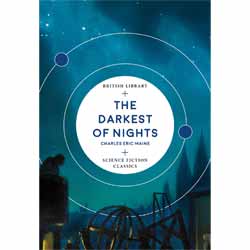|
Click here to return to the main site. Book Review
Pandemics are nothing novel, the Black Death alone killed seventy-five million people in the fourteenth century and the Spanish flu infected one third of the world’s population, killing more people than the whole of the First World War. The Darkest of Nights (1962, reprinted 2019. 317 pages) is another apocalyptic, science fiction novel by Charles Eric Maine. Maine wasn’t the only writer, around this time, who was interested in the human reaction to world ending events. In the same decade J. G. Ballard wrote The Wind from Nowhere (1961) and The Drowned World (1962), though, overall Ballard was kinder to his protagonists than Maine. Where Ballard tended towards the cosy apocalypse with each of the books ending with some level of hope, Maine felt that the end would be grittier, less heroic and more final, as society breaks down and people turn on each other in a desperate fight for survival. One of Maine’s strengths is his ability to write strong female roles with his female protagonists having more resilience and moral compass than his males. In the current novel Dr Brant is working on the latest plague to break out in the far east. The strain is virulent, swift and almost one hundred percent fatal. As the situation gets worse, she returns to Britain to carry on research for a cure. When she reunites with her husband, she discovers that he is already having an affair and wants a divorce. Clive, ever open to personal opportunities, is dating the daughter of a press baron. With the girl comes a new and lucrative professional opportunity for a journalist with some very loose morals. Before any of the main protagonists can get their plans in place the plague sweeps across Europe, finally reaching England. With the real possibility of civil unrest Clive is hired by the government to produce fake news, while at the same time the government prepares to build shelters for the good and great to ride out the coming catastrophe. The book is not dissimilar to his earlier novel, The Tide Went Out (1958) with its prescient view of the ability of media to create fake news to control populations. More so than the previous novel, the book highlights the inherent unfairness of the class system in Britain and in the last fight for survival the country descends into a class war. Although well written there can be no denying that the novel is a dark read. If Ballard allowed a ray of hope in his novels, Maine is certain that human nature will make sure that we will die with our bloodied hands wrapped around each other’s throats. 8 Charles Packer Buy this item online
|
|---|

